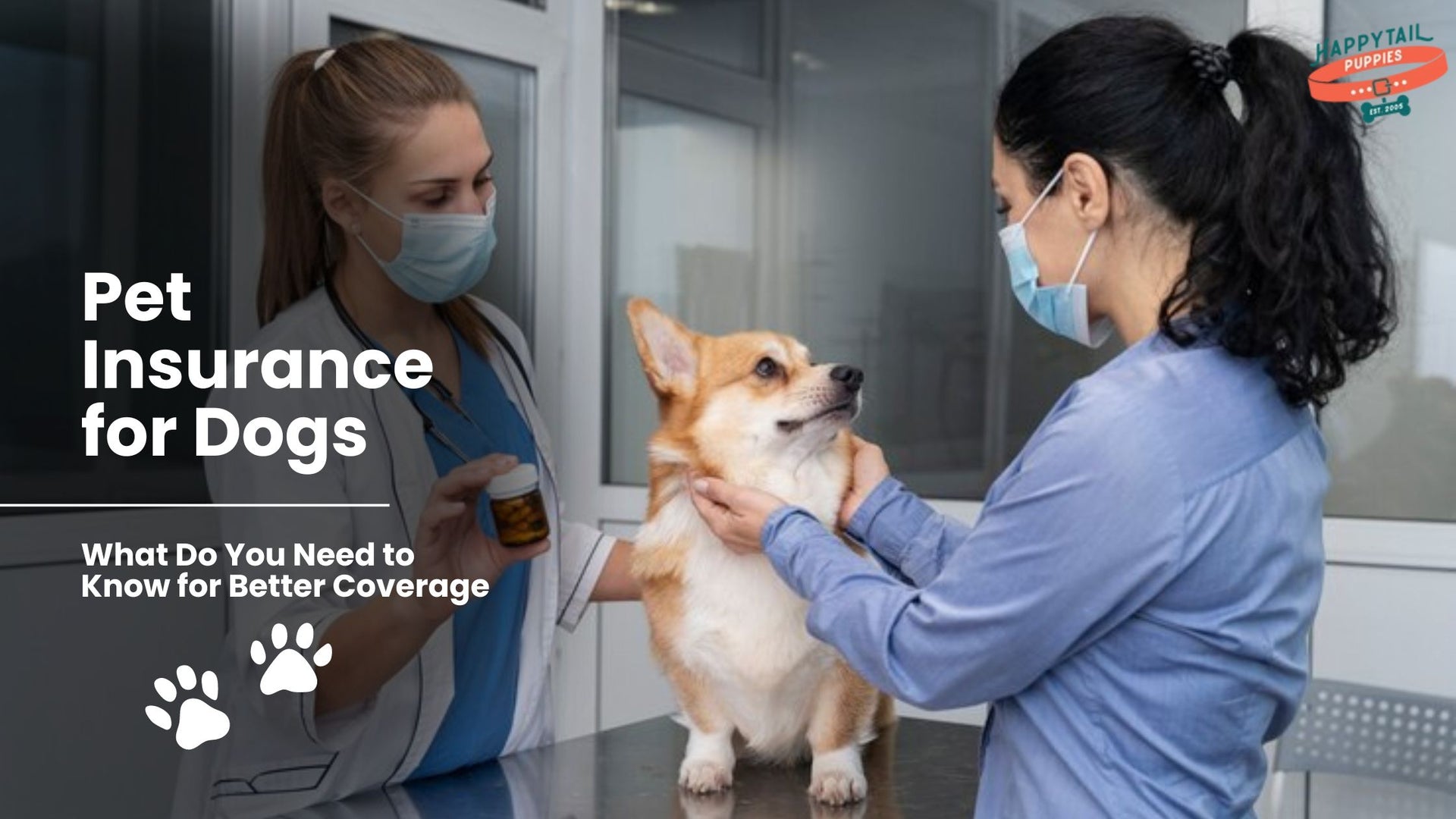Pet Insurance for Dogs: What You Need to Know for Comprehensive Coverage
Similar to us humans, pets like dogs have a funny habit of getting into the scrapes whenever you are least expecting it. Dog hiccups often lead to vet visitations, and they are never often the light on the wallet, whether it is a misjudged leap right off the couch or any other surprising allergy.
Owning dogs is often a highly rewarding experience; however, when it comes to taking responsibilities, that includes ensuring that your furry companion gets the best care. Pet insurance for dogs has turned out as the key tool for every dog owner who wishes to safeguard their pet from any unforeseen health-based issues and at the highest costs that are often associated with event care. In our post today, we are going to offer an extensive guide on dog insurance that covers the perks involved, the kind of coverage, factors involving costs, and more.
Why Pet Insurance for Dogs is Essential
Dog health insurance plays a vital role in safeguarding the health of these adorable pets whenever the situation calls for it. If you own dogs such as Yorkies, backed with the right health insurance will help protect your furry companion as well as prove affordable for you to manage their treatment costs. So once you know about teacup yorkie life expectancy, it is important to get the best life insurance for them. Unlike healthcare for humans, where it is compulsory to have insurance, having insurance for dogs is optional. However, choosing it would make a critical difference whenever any unexpected medical issues arise.
Financial Protection
Dog insurance critically serves as the most economic defense, working against any unanticipated vet costs. Treating accidents and illnesses is often expensive and will make you come across financial restraints; having the right dog health insurance will offer appropriate coverage for your furry friend whenever the situation calls for it. The insurance focuses on the essence of having the modes of funding behind the costs so that one can handle their pets when they fall ill.
Accessing High-Quality Care
Frequently, dog insurance enables improved care options without considering the costs involved, as this involves better access to highly specialized forms of treatments with advanced diagnostic processes for your pets.
Peace of Mind
Whenever you are aware that your dog's unexpected treatment cost is covered, you have better peace of mind. You can focus on ensuring that your pet is healthier instead of stressing about how much it would cost to treat it.
Pet insurance often covers the treatment whenever your furry companion falls sick or gets hurt. The insurance payout is considered when the typical condition is covered through the insurance plan, and the insurer will help you cover the costs involved with prescription medicine, diagnostic tests, surgery, emergency care, and hospitalization.

Types of Pet Insurance for Dogs
Pet insurance for your furry companions comes in distinctive forms, and each offers varied coverage based on your dog's needs.
- Puppy Insurance: Puppy insurance is specially created to target young dogs' unique requirements. Infectious and congenital diseases are some of the common diseases that affect puppies more than adults. The option of puppy insurance entails a number of facilities, such as vaccination, checkups, and treatment of various diseases that puppies mostly contract. Enrolling your puppy young can also give you an opportunity to pay low premium prices as well as avail of ongoing insurance for your growing puppy.
- Insurance for Older Dogs: Some of the diseases that may affect dogs as they grow old are arthritis, diabetes, and heart complications. There is pet insurance for older dogs who are more likely to fall ill with these age-related diseases. However, it is recommended to enroll your dog with an insurance company before he is elderly because elderly dogs are not covered, and their policies are often limited because of age or conditions before their policy can take effect.
- Comprehensive Coverage: The option of health insurance for dogs entails a broad spectrum of treatments for various ailments, accidents, and even routine medical expenses. This sort of insurance may comprise necessary physical check-ups, immunization, dental care, and even holistic treatments such as acupuncture or chiropractic care. Broad policies are the most flexible and provide maximum coverage to pet owners who would wish to ensure that every aspect of the dog is insured.
- Accident-Only Coverage: If pet owners are interested in basic coverage beyond the costs of accidents, including fractured bones or injuries, then it is cheap to opt for accident-only insurance. This kind of policy entitles the holder to payments for medical bills incurred due to an accident, but it does not pay for sick bills or bills for health check-ups.
- Time-Limited Policies: A limited coverage policy offers insurance for a pet for a set time, normally 12 months, for any condition. After this period, the condition is not granted anymore. This type of policy may allow the policyholder to save money due to lower premiums. Still, because it only covers accidents, it may not be beneficial for a dog with a long-term illness that needs constant medication.
Understanding Dog Insurance Costs
The Dog insurance cost typically varies massively based on numerous factors. Knowing about such factors can help you locate the right policy that aligns with your budget while rendering the appropriate coverage to meet your dog's needs.
- Breed: Some dogs are predisposed to certain illnesses or diseases, which may help determine the cost of the insurance. For instance, a large breed of dog, such as the golden retriever, may be more susceptible to joint issues than a small breed, such as a bulldog, Miniature Dachshund, or Cocker Spaniel, which may have issues linked to breathing. Insurers consider these breed-specific risks when determining premiums.
- Age: The age of the dog is also another factor that determines the insurance cost when your dog is taking the insurance. As the dog grows older, the risk factors for developing various diseases rise, hence the high costs.
- Health Conditions: The cost and availability of insurance will still depend on your dog's health, diet, and age, and if your dog has pre-existing conditions, this can also affect the insurance. If you own a Goldendoodle and follow an appropriate Goldendoodle diet for their health conditions, it can help make them stay in a better condition. Some insurance companies may provide insurance for these illnesses at a cheaper price, while others may not cover them at all. You have to make sure that you provide honest information, especially regarding your dog’s health history when claiming the future.
- Policy Type and Coverage: The level of coverage and the type of policy you opt for will also determine the cost you’re going to be charged. With higher coverage of various health problems and health promotion or even better coverage of preventive care, there will be higher costs compared to accident-only or limited-time coverage plans all through the year. While there is a lack of comprehensive information processed, there can be more benefits and risk mitigation in the long run when the coverage is broader.
- Deductibles and Co-Payments: The amount of money you, as the policyholder, agree to pay before the insurance starts covering other costs is called the deductible; the portion of the costs that you are willing to pay before the insurance does is called the co-payment. These are other factors that are likely to influence premiums. This leads to lower premiums but more costs when it comes to having to pay for the claim, such as higher deductibles and co-payments.

Coverage for Pre-existing Conditions
When it comes to Pet insurance for dogs with pre-existing conditions is the issue of the exclusion of pre-existing conditions. These are the health issues that your dog had prior to taking the insurance policy on them. Pre-existing conditions, especially once you own small dog breeds and know the key difference between Shih Tzu vs Shih poo, are an avoidable risk. Therefore, most insurers are cagey about underwriting them.
- Challenges: Some companies that offer pet insurance policies exclude certain conditions from their policies, and policyholders who seek treatment for such conditions are normally refused reimbursement. This can become a major disadvantage, especially for dog owners who may already have dogs with constant or recurrent health complications.
- Options: Some insurance companies provide coverage for pre-existing conditions, though under limited conditions. For instance, with the given disease, the insurer should consider the time the dog has not shown any symptoms and then extend the coverage.
- Managing Costs: Compared to normal dogs, dogs with other health issues will require more attention when selecting a policy to purchase. You may also wish to explore other possibilities, for instance, opening a special bank account for your pet’s health-related expenses or trying to find special discounts for your dog’s healthcare that would substantially lower the prices for procedures.
How to Choose the Right Pet Insurance Policy
In choosing the ideal policy to insure your dog, there are a few things you need to consider. Here are some tips to help you make an informed decision with dog health insurance:
- Assess Your Dog’s Needs: Breed, age, and health history should also be considered when choosing your insurance policy. A young dog may be more benefited by a health insurance policy with a high degree of preventive care, and senior dogs will require coverage, especially in the event of certain age-related ailments.
- Compare Policies: Be sure to go through our guide on how to compare puppy insurance plans and providers. This helps provide better insight into the coverage options available, the alternatives that are excluded under the policy, the deductibles involved, the co-payments, and the premiums within the policy plans offered by various insurance service providers.
- Read the Fine Print: The policy includes and also excludes certain aspects, and no matter how comprehensive and wide-ranging a policy might seem, there are always certain areas of cover that are outside the policy. Some of the policies may be void for certain breeds and clinical conditions or may have a waiting period before coverage is given. You will be able to avoid unpleasant surprises should you be under any insurance policy when the time comes to claim if you understand those little details.
- Check Reviews and Ratings: Browse through the reviews and ratings of other users in regard to various insurance companies. Spotted positive reviews and high ratings can also mean that the customer service is accurate and the process of filing for a claim is as smooth as it gets. Negative, on the other hand, would alert the respondent of possible problems with the provider.
- Consult Your Veterinarian: Speaking to your vet is likely to be useful in that they can advise on what kind of coverage would be more useful to your dog. They can also advise on the type of insurance that they have observed suits different pet owners.
Benefits of Comprehensive Pet Insurance
Pet insurance for dogs with a broad spectrum of insurance coverage has a number of benefits in addition. Here’s why investing in a comprehensive policy can be beneficial:- Broad Coverage: Accidents and sickness include all sorts of health disorders, which can be of various natures: accidental as well as planned treatments, preventive as well as curative, and allopathic as well as unconventional. This broad coverage is very important as it covers most related health risks and gives the pet owner, that is, you, the needed confidence.
- Preventive Care: Most all-inclusive insurance policies also have provisions for precluded services, including vaccinations, flea and tick treatments, dental care, and wellness examinations. You must make sure to take your dog for preventive care to avoid health complications that may arise.
- Coverage for Chronic Conditions: Comprehensive pet insurance entitles the owner to coverage that encompasses long standing ailments that need regular care, such as diabetes, arthritis, or allergies. This can be especially helpful if the dog is senior or of a breed commonly known to have certain health challenges.
- Flexibility: These extensive programs enable owners to select the veterinarian of their choice, including specialists, which means that you can find the best doctor for your dog. Moreover, such policies may contain choices to attach riders or toppings, which are special types of coverages for particular requirements, such as traveling or prolonged coverage of family-inherited diseases.
Conclusion
Pet insurance for dogs is one of the most valuable and lifesaving products that will assist one financially, emotionally, and physically to ensure the dog you love so much gets the best treatment when sick. Preventing expenses included in health policies are in addition utilized to include thorough pet insurance that is not only a health cover for emergencies and illnesses but also their preventive care. Do not let it come to this; find yourself a reputable place to get your dog insured today so that his health problems can be catered for.
Frequently Asked Questions
Can I Get Pet Insurance If My Dog Is Hurt?
Subsequently, you can get pet insurance for any future accident and illness when having a specific type of pet insurance coverage. The policy does not include any pre-existing diseases, whether let alone diagnosed or not.
Can I Claim Insurance If I Hit a Dog?
In other words, if ever you have acquired a comprehensive or own damages policy, then you will be protected against any accidental damages that you may have made to your car.
Does House Insurance Cover Dogs?
However, pet damage is not usually covered by most of the home insurance policies commonly used by homeowners. This is because animals are unpredictable at times, and hence, insurance companies are still determining the extent of loss that your pet is most likely to cause.
What Is the Condition Limit on Pet Insurance?
If you plan on claiming the vet costs involved, the condition limit is the amount that you would claim for vet fees in every policy year.


